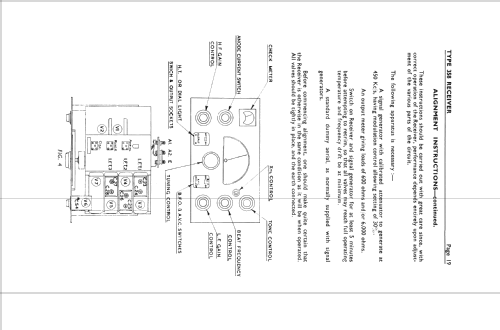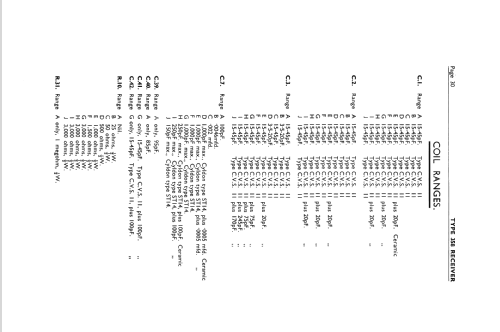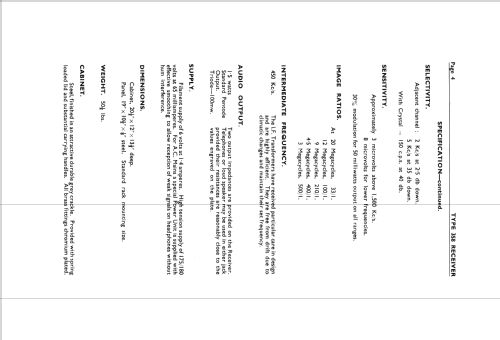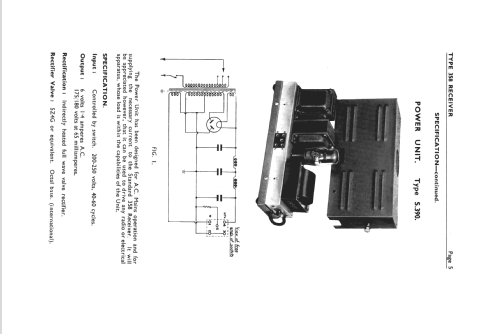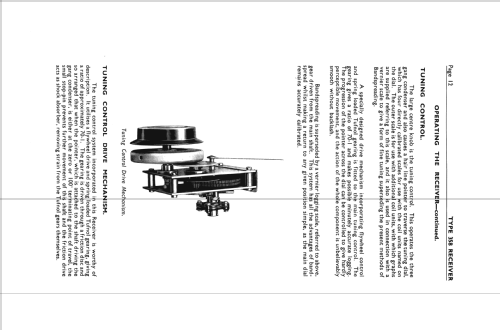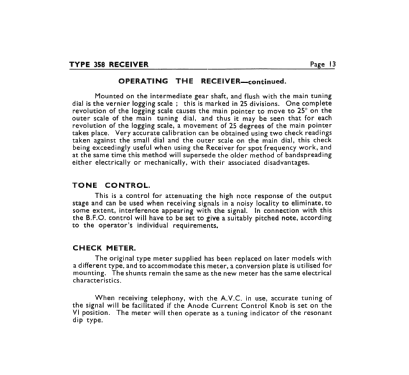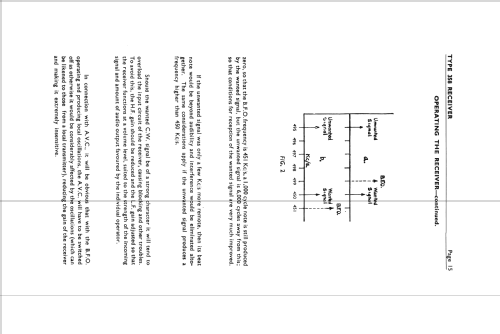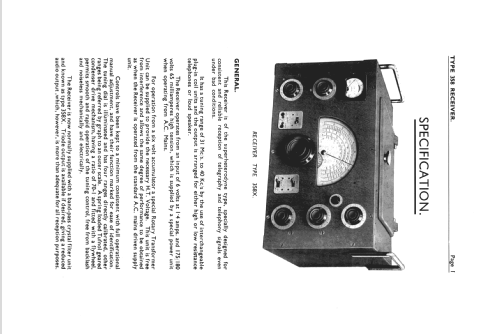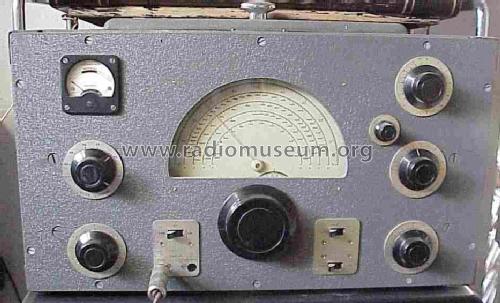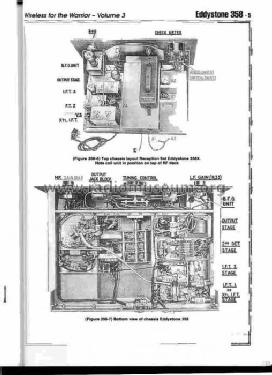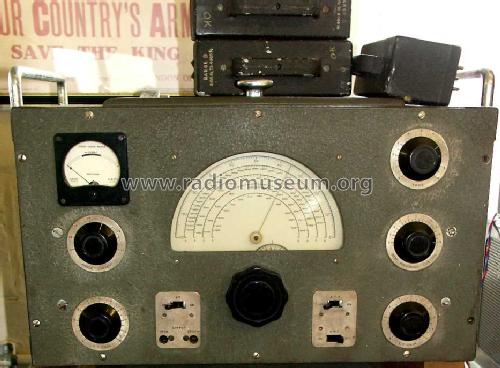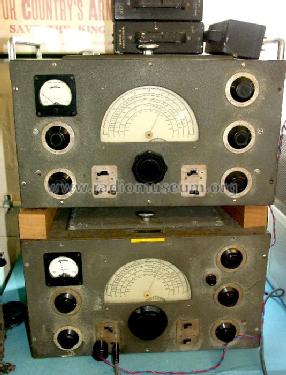- Produttore / Marca
- Eddystone (Brand), Stratton and Co., Ltd., Eddystone Radio Ltd.; Birmingham
- Anno
- 1940
- Categoria
- Ricevitore professionale (può includere bande amatoriali)
- Radiomuseum.org ID
- 95007
Clicca sulla miniatura dello schema per richiederlo come documento gratuito.
- Numero di tubi
- 8
- Principio generale
- Supereterodina con stadio RF; ZF/IF 450 kHz; 2 Stadi BF
- Gamme d'onda
- Onde medie (OM) e più di 2 gamme di onde corte (> 2 x OC).
- Tensioni di funzionamento
- Alimentazione a corrente alternata (CA) / 200-250 Volt
- Altoparlante
- - Per cuffie o amplificatori esterni
- Potenza d'uscita
- 1.5 W (qualità ignota)
- Materiali
- Mobile di metallo
- Radiomuseum.org
- Modello: 358 - Eddystone Brand, Stratton and
- Forma
- Soprammobile con qualsiasi forma (non saputo).
- Dimensioni (LxAxP)
- 20.5 x 12 x 13.5 inch / 521 x 305 x 343 mm
- Annotazioni
- Coverage 40 kHz - 31MHz in 10 bands. Wave band is changed by plugging in different coil units.
No crystal filter, note the lacking switch left of "tone" and "BFO" controls (see 358X for model with crystal filter).
Matching external Power supply S390 supplying 6V LT and 175/180V HT.
Army tube designations: ARP34 ARTH2 ARP34 ARP34 AR21 ARP34 VT52 ZA3489.
Navy designation Receiver B34.
- Peso netto
- 22.9 kg / 50 lb 7 oz (50.441 lb)
- Bibliografia
- Wireless for the Warrior Vol.3
- Autore
- Modello inviato da Nigel Hulse. Utilizzare "Proponi modifica" per inviare ulteriori dati.
- Altri modelli
-
In questo link sono elencati 255 modelli, di cui 125 con immagini e 46 con schemi.
Elenco delle radio e altri apparecchi della Eddystone (Brand), Stratton and Co., Ltd., Eddystone Radio Ltd.; Birmingham
Discussioni nel forum su questo modello: Eddystone Brand,: 358
Argomenti: 2 | Articoli: 2
For changing of wavebands, plug-in "coil units" have to be put in place inside the receiver. A hinged cover gives access to the chassis of the receiver, the shielded coil units (aerial, mixer and oscillator coils) are plugged in on top of the chassis.
The band segments are as follows:
Range A: 22000 - 31000 kHz
Range B*: 9000 - 22000 kHz
Range C*: 4500 - 9000 kHz
Range D*: 2100 - 4500 kHz
Range E*: 1250 - 2100 kHz
Range F: 600 - 1250 kHz
Range G: 300 - 600 kHz
Range H: 150 - 300 kHz
Range I: 90 - 150 kHz
Range J: 40 - 90 kHz
The set has a calibrated dial only for band segments B, C, D, E, for the other band segments, the operator has to rely on the 0 - 100 logging scale and prepare his own wavelength chart.
The band segments are as follows:
Range A: 22000 - 31000 kHz
Range B*: 9000 - 22000 kHz
Range C*: 4500 - 9000 kHz
Range D*: 2100 - 4500 kHz
Range E*: 1250 - 2100 kHz
Range F: 600 - 1250 kHz
Range G: 300 - 600 kHz
Range H: 150 - 300 kHz
Range I: 90 - 150 kHz
Range J: 40 - 90 kHz
The set has a calibrated dial only for band segments B, C, D, E, for the other band segments, the operator has to rely on the 0 - 100 logging scale and prepare his own wavelength chart.
Martin Bösch, 02.Jan.07
these are the tube substitutes according to a manual for the 358x found at BAMA:
.png)
hope that helps mb (edit: Graphic mit verbesserter Lesbarkeit, danke GR)
.png)
hope that helps mb (edit: Graphic mit verbesserter Lesbarkeit, danke GR)
Martin Bösch, 02.Jan.07


